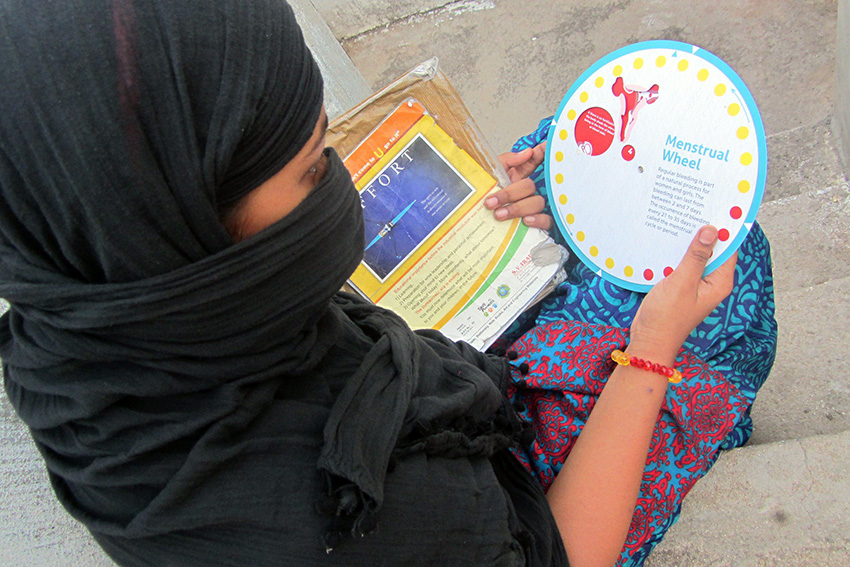
Photo Credit: Stella Paul/IPS
Despite the COVID-19 pandemic, basic health needs are largely unchanged, including the need to manage menstruation hygienically, safely and with dignity. As advocates around the world point out, periods don’t stop for pandemics.
On Menstrual Hygiene Day, and every day, FHI 360 works around the world to ensure equitable access to quality menstrual products and appropriate sanitation facilities. We also engage government officials, teachers and community members to improve school-based education, raise community awareness and help fight period stigma. And, we must not forget an important group of people who menstruate: those who are using – or want to use – contraception.
Reliable access to high-quality, voluntary contraceptive services is critical at all times, including during a crisis such as a pandemic. Importantly, menstrual health and contraceptive use are interconnected. For example, many individuals using hormonal contraceptive methods or the copper intrauterine device (IUD) experience changes to their menstrual cycles. This includes potential changes in bleeding duration, volume, frequency and predictability, as well as menstrual cramps and period pain.
There are several steps we can take to address menstrual health for those who are using or want to use contraception:
- Meet the unique menstrual health needs of contraceptive users. Globally, there are more than 400 million users of hormonal contraception and copper IUDs. Contraceptive-induced menstrual changes may mean that these users require different types and quantities of menstrual products, as well as access to sanitation facilities with adequate wash water at different times and frequencies. It is crucial that both menstrual health and family planning programs address menstrual health education and support access to products and sanitation.
- Recognize the potential benefits of contraceptive-induced menstrual changes. Often contraceptive-induced menstrual changes are viewed as negative side effects, but they can have important health and lifestyle advantages for some people. Notably, some hormonal methods can alleviate menstrual disorders and symptoms, including endometriosis, menorrhagia (heavy menstrual periods) and dysmenorrhea (menstruation accompanied by pain). And, some hormonal methods may help prevent or reduce iron-deficiency anemia. Those individuals who experience reduced or paused menstrual bleeding when using contraception may enjoy lifestyle benefits, such as an increased ability to engage in school or work activities or financial savings from reduced need for menstrual products. Alleviating the burden of having to manage menstruation could also be particularly important during the pandemic if there is disrupted access to menstrual products or sanitation facilities or reduced household income to purchase supplies.
- Normalize menstrual changes as part of self-care. Many family planning users are not given adequate information or counseling about contraceptive-induced menstrual changes. Health care providers and community educators should reassure users that these changes are normal, combat myths and misinformation, and discuss implications of menstrual changes when clients are selecting a method. This awareness and education can help facilitate self-care. Specifically, if people can self-reassure when they experience menstrual changes, it may translate into the need for fewer provider visits and improve satisfaction.
There are many untapped interconnections between menstruation and family planning. We must consider the menstrual health needs of all people who menstruate, including contraceptive users. Especially during the COVID-19 pandemic, when access to the services, products and facilities for managing menstruation and fertility may be threatened, it is vital to strengthen these connections.
